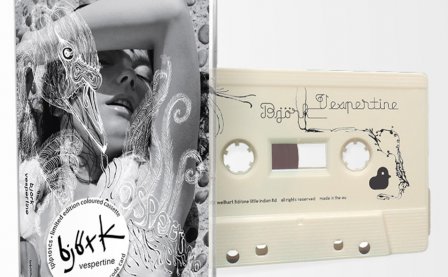Björk has often been portrayed as a prophetic spokesperson for music. Throughout the '90s, she was sanctified almost to the point of a deity, untouchable, a conduit in which the future of music pulsated; she became a beacon for a generation inundated with the attempts of modern radio to provide formats and to capitalize on trends. To us, she was the future of music; and by the time she released her third album, Homogenic, the music community became enraptured at the sophomoric idea of a new musical savior, here, at last, to save us from the shackles of modern radio.
It's now 2004, and in retrospect, Björk's contributions to music throughout the '90s owes perhaps as much to good-timing as her innate brilliance. The penetration of new technology in the mainstream coupled with her singular voice provided the veneer that convinced nearly everyone that Björk was, in fact, a messenger from the future. This is not to undercut Björk's groundbreaking innovations, but rather to point out the absurd attempts of fans and music critics (like myself) to idealize Björk's significance to poetic ends. In fact, it is more trivializing to equate her music with the future instead of actually coming to terms that Björk was born in 1965, not 2023, and still wrote such forward-thinking music.
But now that we've finally become accustomed to Björk's voice and new technological developments seem more like refinements, I think it's safe to say the music community is finally able to digest her new album, Medülla, in a more appropriate context. Rather than demanding something more "futuristic," Medülla can be heard as a natural progression in Björk's musical trajectory. Her albums have consistently become more insular, more introspective. And if you look at the relationship between Björk's voice and the underlying instrumentation, from Debut to Vespertine, you'll see that her voice is now in full control. Instead of singing over interesting beats and scattered rhythms (e.g. Debut and Post), Björk uses her voice to dictate where the music goes.
This idea could not be more obvious with Medülla. With help from a wide range of beatboxers, vocalists, songwriters, choirs, and programmers, Björk has created an album almost entirely made up of vocals. From the Gregorian chant-like "Vökuró" and the a cappella "Show Me Forgiveness," to the almost cloying chorus of "Who Is It," Medülla comes equipped with a vast array of vocal-only tracks that tread disparate emotions and dynamics, keeping the album far from wearing thin. In addition to some of the tracks sung in her native tongue, at least a couple of the songs feature non-vocal instrumentation, or at the very least, processed vocals that have been manipulated beyond recognition.
And then there's the beatboxing. With virtuoso beatboxing by Rahzel (The Roots), Shlomo, and Japanese artist Dokaka, tracks like "Where Is the Line" and "Oceania" sound virtually pre-programmed. It's quite astonishing to hear such low bass and intricate percussive noises being achieved through different mouth contortions. In fact, the beatboxing sounds so convincing that it's easy to mistake it as programmed, causing a lot of the beat-oriented tracks to play like typical Björk songs converted into vocal renditions (which is likely the case since a lot of them were performed live in the summer of 2003). This is not necessarily a bad thing, but the beatboxing -- perhaps the most awe-inspiring aspect of the album -- does serve to limit the full potential of the voice to showcase its inherent timbres and rhythms.
Consequently, Medülla is at its best when the voices are allowed more freedom than when simply mimicking what another instrument can already do. Among the more notable tracks showcasing this freedom are "Submarine," which features the vocals of Robert Wyatt; and "Öll Birtan," which masterfully employs counterpoint to its most affective end. But this idea is most pristinely and ironically exemplified on a track that features the unmistakable sound of piano. Titled "Ancestors," Björk's voice finally blends in with a handful of other musicians (as opposed to being so easily discernible), creating a discordant mess that hardly seeks resolution. This track by far exploits the endless possibilities of the voice, revealing the most beautiful moment on the album that, unfortunately, is never again achieved.
But any negative is easily overlooked when surveying the positives. Though hardly Björk's most pronounced statement, Medülla is definitely a highlight of her already illustrious career. Though I could spend many more moons discussing the intricacies of each song, the lyrics, the overall dynamics, and the significance of the collaborations, I think they're best left to individual interpretation. It remains to be seen what place Medülla holds in Björk's musical canon, but one thing is for sure: The time for idealized notions of a musical prophet is over, and the time for new ways of listening is here. This is the sound of an artist who is not ready to dawdle in any one winning formula.
1. Pleasure Is All Mine
2. Show Me Forgiveness
3. Where Is The Line
4. Vökuró
5. Öll Birtan
6. Who Is It (Carry My Joy on the Left, Carry My Pain on the Right)
7. Submarine
8. Desired Constellation
9. Oceania
10. Sonnets / Unrealities XI
11. Ancestors
12. Mouth's Cradle
13. Miðvikudags
14. Triumph Of A Heart
More about: Bjork




